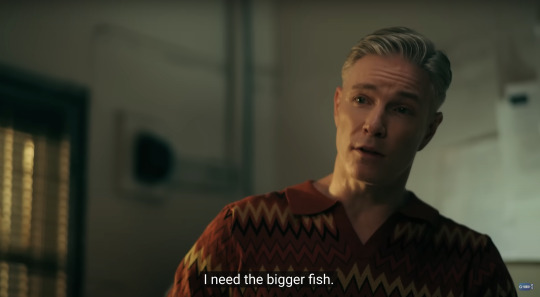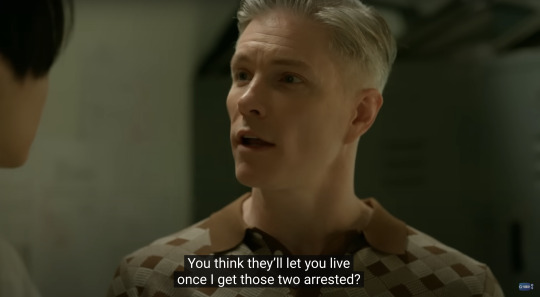#especially when they mean it from their heart which i do think fadel does and he's not being just sarcastic
Explore tagged Tumblr posts
Text




You know damn well Mother doesn't want us to get involved with anyone.
#fadel x bison#the heart killers#thkedit#asianlgbtqdramas#khaotung thanawat#joong archen#antedits#vishingwell#tuserhidden#tuserjovana#khaotunq#userbon#tuserrowan#ninisdarlings#useragatha#tusermona#userrlana#userrlaura#becauseigtf#usertaeminie#flashing tw#lines like this from older brother's will always fuck me#especially when they mean it from their heart which i do think fadel does and he's not being just sarcastic#other people will come and go but he'll always be the constant in bison's life
342 notes
·
View notes
Text
at first i didn’t think the “fadel is faking it to get info on style” thing was a genuine theory people were believing but i saw so many people thinking it in the comments of an edit of the scene in the woods on tiktok and just. i fear it comes from a genuine misunderstanding of fadel as a character.
like in general fadel is just. not a liar. like i feel like one thing we’ve learned about fadel is that despite coming off cold and kind of mean and you know being a literal assassin, he has very strong morals, and it seems like one of those morals includes honesty. or in the very least - not lying. cause obviously he has to a certain extent for his work as an assassin, but in general most things about that job go against fadel as he is - he just justifies it all by telling himself what their mother told him, that these are bad people who deserve it. and he has so many opportunities to lie to style and say no i don’t like you, or no, i don’t find you attractive, or x y z, but his method of dealing with style is always avoidance, rather than directly lying to him. so for him to fake a very real, very vulnerable confession, it just doesn’t make any sense.
especially because the other thing we know for sure about fadel is that he does Not do vulnerable. he has an extremely rough and hard exterior for a reason - even BISON says he thinks fadel is rough on the inside as well. if even bison, who is fadel’s brother and the person he cares about the most, believes fadel isn’t capable of love and vulnerability, i don’t believe for a second fadel would want to or even be willing to fake that kind of thing. his vulnerability in that scene came from a genuine place and breaking point - you can hear it in his voice. which like, shoutout to joong because his acting in that scene was fucking incredible and i feel like it’s a discredit to him as an actor to claim any of that felt fake but i digress. and sure, maybe fadel is just a good actor, and sure he likely has the best poker face, but with how allergic he is to acknowledging his feelings, i don’t believe he’d be able to fake it.
plus, we also know for a fact he wasn’t lying because we saw during the episode the ways he was missing style - he didn’t even ask anyone anything at his morning jog, so we know for sure he wasnt just looking for style for show.
and while i understand wanting to justify the fact that it seems like he broke quickly, i just think if you feel the need to question that, you haven’t actually been paying much attention to fadel at all. or you just have a fundamental misunderstanding of how repression works. because fadel has been repressing himself for very likely years, has been holding in an insane amount of pain and grief for so long - like, it’s clear that even bison is unaware of the fact that fadel once had someone he loved and lost. which means the only people he’s talked to about it are the strangers at the loss support group - IF that because i would not put it past fadel to never say a word at those meetings, i mean in both instances that we see him in the group setting, he doesn’t say anything even before style shows up.
fadel has had his heart walled up and been dealing with his grief and loss all on his own. and he has spent WEEKS pushing style away and trying to keep him at arms length. so of course, of course when someone comes in and not only says they want him, his heart, and comes in with sledge hammers to tear down those walls, they’re gonna crumble.
and you know maybe i’ll eat my words, but i just can’t fathom the idea that any of that confession was fake to fadel, and i think if you do you’re just misunderstanding him.
103 notes
·
View notes
Text
Ok, genuinely asking cuz I think I missed something??




So the captain is using Kant (and Style) to get evidence, not on Fadel and Bison, but specifically because they want whoever is behind them, right? That's the whole reason for this ruse to begin with.

So, like, okay he's still the police and they're pretty sure there's going to be an attempted murder, so they have to be there to try to prevent it. But if they actually arrested Fadel and Bison, their boss would probably go to ground and be impossible to find.
(Especially if the captain/police don't know about the dysfunctional psudo family relationship that Fadel and Bison have with Lilly.)
So, did Bison and Fadel only get away in episode 6 because they captain intentionally let them go? Is he still hoping to use Fadel and Bison to get to their boss? (Was the motherfucker just a hilariously dramatic act for show?)


If so, why does Kant think he's done? At first I thought it was because he thinks the brothers have been caught, but he tells Style, "You have to get over it. You can't ever get together with him. Move on." which suggests that Kant thinks Style has the opportunity to try (ie. he knows Fadel hasn't been arrested yet).



Clearly, Kant understands that Fadel and Bison's arrest is an inevitability, that it's only been delayed because they're not interested in taking out only the people on the field. So he should know that Fadel and Bison not being arrested means the ruse is very far from being done.
Maybe Kant means it like: I'm done, I can't do it anymore, my heart won't let me lie to Bison again. ;A;
But even so, at this point (the day after the botched shooting), Kant hasn't discovered anything more than what he gave to the captain when the captain refused to agree that Kant was done the previous day, so like... why does he think he's done???!?
I'm just feeling very confused as to what, exactly, the captain's plan is now... Cuz surely the police know that Fadel and Bison are going to be suspicious about the undercover police presence at the charity event. Which therefore puts their moles (Kant/Style) at risk of not only being discovered, but being fed false information. Is the captain so confident in Kant (and Style's) seduction that they think Bison and Fadel will come back with NO caution?
Or am I just taking it all too seriously and this is one of those "accept the suspension of disbelief" moments? Should I just assume the police people aren't actually that smart? This is, after all, a comedy.
#the smart thing to do would've been to prevent the murder whilst still pretending to be wait staff/not showing that they were police#that way fadel and bison think it was purely their own fault for screwing things up#and have no reason to think the police knew before hand that they were going to strike then#it would've worked too cuz bison was the one that messed things up anyway#also the lights turning off was interesting; i wonder if that was always the plan as part of their getaway strategy#or if the police set it up so the brothers would have a believable way to escape?#anyway plot musings i'm having in between trying to avoid my aunties and uncles questions about why i don't have a husband yet 😫#curious to see if anyone else has Thoughts???#the heart killers#the heart killers the series#thk ep 6
42 notes
·
View notes
Text
Being Present: Jon Kabat-Zinn
Finding an antidote to the drivers of distraction — our fears, our judgments, our feelings — has been a long-standing project for Jon Kabat-Zinn, PhD. Even as a child, the man who’s now recognized as a pioneer in mindfulness meditation felt something was off about the way living seemed focused on external rather than internal forces.
“We’re actually imprisoned by what we’re unconscious of,” he explains. “Not a moment goes by in which we don’t like this rather than that or want this more than that. Mindfulness is awareness that arises from paying attention on purpose in the present moment, nonjudgmentally, so you begin to notice how insanely judgmental we are.”
He began meditating in 1966 as a grad student at the Massachusetts Institute of Technology (MIT) while working toward his doctorate in molecular biology.
During the Vietnam War, he became a staunch antiwar activist. In 1969, while leading students in protest to halt MIT’s role in making nuclear warheads, he called out the United States’ larger distractions, fears, and judgments, stating that we were approaching a disaster of major proportions.
Seeing the mind–body connection as essential to individual — and global — health and well-being led Kabat-Zinn to combine Buddhist teachings in meditation with medicine to treat chronically ill patients. In 1979, he spearheaded the formation of the Stress Reduction Clinic at the University of Massachusetts Medical Center.
At the heart of the clinic’s practices is Kabat-Zinn’s Mindfulness-Based Stress Reduction (MBSR) program, which teaches patients to use innate resources to respond to stress, pain, and illness. More than 20,000 people have completed the eight-week MBSR program, while countless others have been introduced to contemplative practices via Kabat-Zinn’s online guided meditations and many celebrated books, including Wherever You Go, There You Are.
“Mindfulness is a skill anyone can learn,” the 74-year-old writes. “What is required is a willingness to look deeply at one’s present moments, no matter what they hold, in a spirit of generosity, kindness toward oneself, and openness toward what might be possible.”
Experience Life | We are living in highly distracted times as a result of rapid technological advances and the convenience of our devices. Why is mindfulness in the midst of all of this a radical act?
Jon Kabat-Zinn | It’s not just a radical act, but a radical act of sanity to drop into the domain of being as opposed to doing.
To stop all the doing for a moment and ask yourself Who’s doing all this doing and why? is tantamount to being who you already are, so no effort is required. It’s not like you have to discover who you are, but more like you have to recover who you are.
We are being driven to distraction by our own increasingly sophisticated and seductively addictive technologies. Not just the hardware, but Facebook, Twitter, Instagram, and all the ways that we have of looking in on each other’s lives and then creating narratives about how great they are and how not so great we are.
As a result, we end up pretending we’re great or tracking how many people like our recent post — and if they don’t like it, it’s a bummer and we go into a quasi-depression. All of this checking winds up enslaving us to those channels.
I just came back from China, and the word for mindfulness in Chinese is niàn. The word is composed of the ideogram for “now” above the ideogram for “heart.” Interestingly, the word for “anger” is the ideogram for “slave” over the ideogram for “heart.”
In this instance at least, that reflects some degree of wisdom in the language itself. We are being enslaved by our impulses to look outside of ourselves for affirmation that we’re OK, or that there’s something more interesting than now that we should be checking because maybe this moment’s not good enough. This is a kind of prescription for insanity and for deep health problems on multiple levels.
EL | How does mindfulness affect our health and lives?
JKZ | When we’re mindlessly moving along, zoning through the present moment to get to better moments, we start believing the narratives we carry. We create stories about who we are, where we’re going, what’s in our favor or against us, how stressed or frightened we are, and how inadequate and unworthy we are. We focus on these thoughts so much that we often believe those assessments of our lives as truths rather than as thoughts.
But they’re just thoughts, and this is where liberation lies. Becoming mindful of our thoughts as just thoughts can free us from the oppression of our unexamined thinking minds. This is powerful for improving mental health, especially if someone’s dealing with anxiety or depression.
The more embodied we are in awareness, the more we’re capable of feeling appropriately what’s here to be felt — anger, sadness, and happiness — and managing our emotional reactivity. We begin having greater clarity and can act and feel with more sensitivity, empathy, and compassion.
EL | How has mindfulness research changed since you began studying it, and what are some of the findings?
JKZ | When I published my first paper on mindfulness and chronic pain in 1982, it was the only paper on the subject in the mainstream medical literature. Research was slow for a long time, but over the next 15 to 20 years, with studies from a small number of groups, people started to get more interested. Now the curve of the number of papers per year in the medical and scientific literature with the word “mindfulness” in the title is growing exponentially. In 2017, around 670 papers were published.
That doesn’t mean the data is all equally good or convincing, but it indicates that the evidence base for the effectiveness of mindfulness in different domains is growing rapidly. One of the reasons is the development of three new scientific fields: neuroplasticity, epigenetics, and the effects of stress on cellular aging and on our telomeres.
Neuroscience is showing that mindfulness practices can restructure brain regions over even eight weeks of MBSR, and perhaps in even less time, making some areas more dense (such as the hippocampus, involved in learning and memory) and others less dense (such as the amygdala, involved in threat reactivity).
Mindfulness also seems to drive what is called functional connectivity in the brain, strengthening communication between different brain regions that, when communicating better, can play a more positive role, for instance, in emotional reactivity under stress and impulse control.
Epigenetic studies are showing that meditation practices can also up-regulate and down-regulate the synthesis and activity of hundreds of genes in our genome, many of which seem to be involved with inflammatory processes that are now thought to underlie many chronic diseases, including cancer.
In terms of biological aging, it is well known that stress accelerates the shortening of our telomeres, the repeat DNA subunits at the ends of all of our chromosomes, which shorten every time one of our cells undergoes mitosis. Work by Liz Blackburn, who won the Nobel Prize for such research, and her colleague Elissa Epel, has shown in some studies that intensive meditation can slow down that shortening of the telomeres and possibly reverse it.
EL | What are technology companies doing to change the designs of hardware and software, and how can mindfulness help us use technology more wisely?
JKZ | Many people in Silicon Valley — including those who invented these technologies — don’t want their own kids near their fantastic inventions. I understand that Steve Jobs, for example, wouldn’t let his kids use his hardware.
Tony Fadell, who headed Apple’s iPod and iPhone teams, is into mindfulness and is developing a counter-revolutionary approach to the slavery we’ve given ourselves over to voluntarily with these devices.
Mindfulness is a powerful practice for becoming aware of the impulse to check your phone. Can you notice the impulse to check in arrive? Can you let it come, let it go, and not check your phone and live your life in that moment? If not, you’re just filling your life up with stuff that’s not your life.
Get the full story at https://experiencelife.com/article/being-present-jon-kabat-zinn/
0 notes